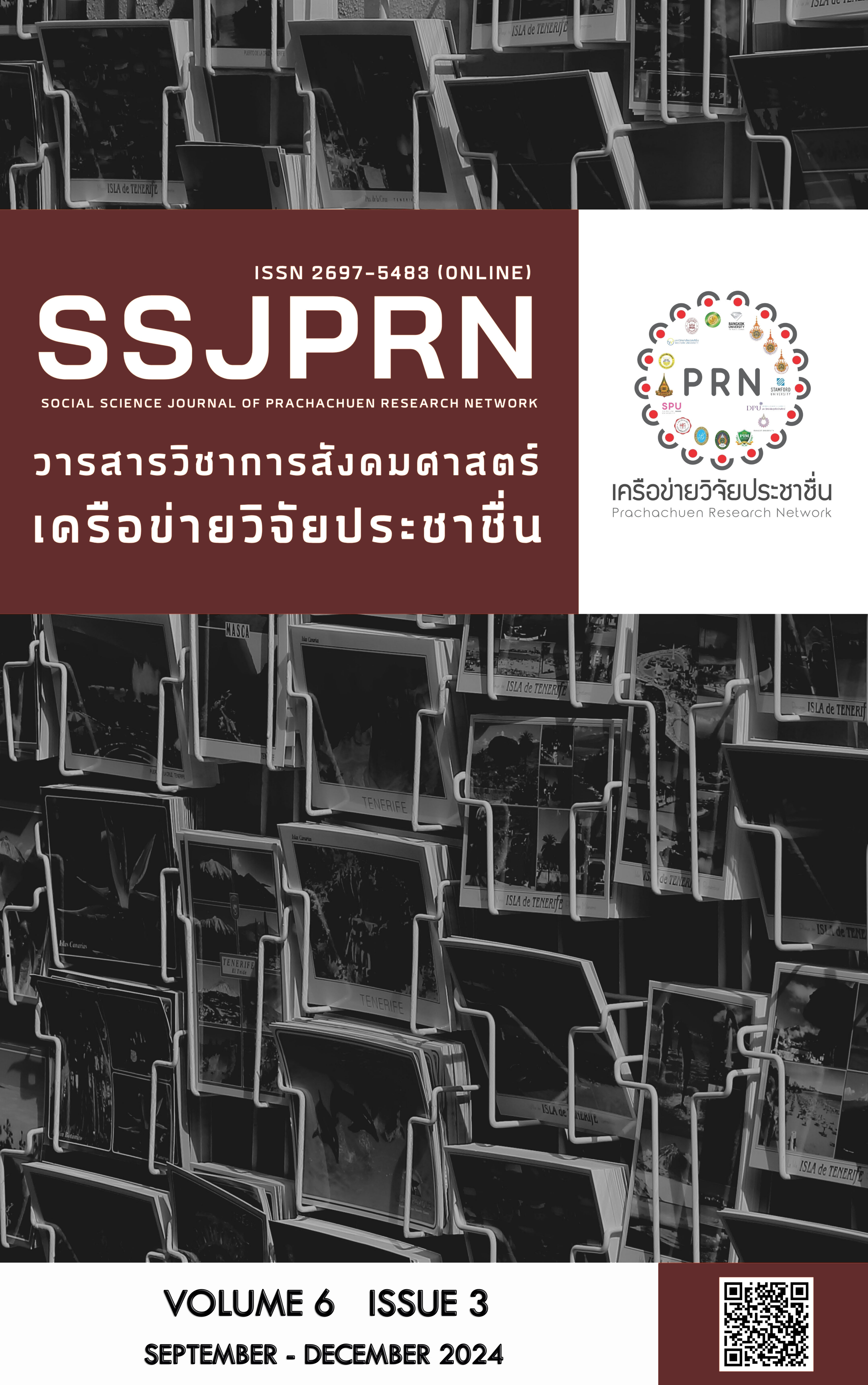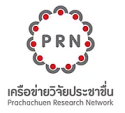อิทธิพลของภาวะผู้นำเชิงเปลี่ยนแปลงและความพึงพอใจในงานที่ส่งผลต่อ ความตั้งใจลาออก: กรณีศึกษาพนักงานบริษัท China Construction International
คำสำคัญ:
ภาวะผู้นำเชิงเปลี่ยนแปลง , ความพึงพอใจในงาน , ความตั้งใจลาออกบทคัดย่อ
วัตถุประสงค์ของการศึกษาครั้งนี้คือ 1) เพื่อตรวจสอบความสัมพันธ์ระหว่างภาวะผู้นำเชิงเปลี่ยนแปลง ความพึงพอใจในงาน และความตั้งใจลาออก และ 2) เพื่อสำรวจอิทธิพลของภาวะผู้นำเชิงเปลี่ยนแปลงและความพึงพอใจในงานที่มีต่อความตั้งใจลาออก โดยใช้เครื่องมือวิจัยคือแบบสอบถาม ตัวอย่างที่ใช้ในการศึกษาประกอบด้วยพนักงานของบริษัท China Construction International จำนวน 400 คน ซึ่งได้รับการคัดเลือกโดยใช้วิธีการสุ่มแบบเจาะจง สถิติที่ใช้ในการวิเคราะห์ข้อมูล ได้แก่ ค่าต่ำสุด ค่าสูงสุด ค่าเฉลี่ย ค่าเบี่ยงเบนมาตรฐาน ค่าสัมประสิทธิ์สหสัมพันธ์เพียร์สัน และการถดถอยเชิงเส้นพหุคูณ
ผลการศึกษาพบว่า 1) ภาวะผู้นำเชิงเปลี่ยนแปลงและความพึงพอใจในงานมีความสัมพันธ์เชิงลบกับความตั้งใจลาออกอย่างมีนัยสำคัญที่ระดับ .01 2) ภาวะผู้นำเชิงเปลี่ยนแปลงมีอิทธิพลต่อความตั้งใจลาออกอย่างมีนัยสำคัญ (p < .001, β = -.530) และ 3) ความพึงพอใจในงานยังมีอิทธิพลต่อความตั้งใจลาออกอย่างมีนัยสำคัญเช่นกัน (p < .001, β = -.227) ผลการศึกษาแสดงให้เห็นว่าภาวะผู้นำเชิงเปลี่ยนแปลงมีอิทธิพลเชิงลบปานกลางต่อความตั้งใจลาออก ในขณะเดียวกัน ภาวะผู้นำเชิงเปลี่ยนแปลงมีอิทธิพลเชิงลบเล็กน้อยต่อความตั้งใจลาออกของพนักงาน China Construction International นอกจากนี้ ความพึงพอใจในงานยังมีความสัมพันธ์กับความตั้งใจลาออกจากองค์กรด้วย ผลลัพธ์เหล่านี้เน้นย้ำถึงความจำเป็นของแนวทางปฏิบัติและกลยุทธ์ความเป็นผู้นำที่มีประสิทธิภาพ จะช่วยเพิ่มความพึงพอใจในงานและการรักษาพนักงานให้อยู่กับองค์กร เพื่อให้องค์กรมีความมั่นคงและคงอยู่ไปได้อย่างยั่งยืน
เอกสารอ้างอิง
Bass, B. M. (1985). Leadership and Performance Beyond Expectations. Free Press.
Burns, J. M. (1978). Leadership. Harper and Row.
Carsten, J. M., & Spector, P. E. (1987) Unemployment, job satisfaction, and employee turnover: a meta analytic test of the Much in sky model. Journal of Applied Psychology, 72, 374–381.
Gaio Santos, G., & Martins, D. (2021). Linking career success motives and career boundaries to repatriates’ turnover intentions: A case study. The International Journal of Human Resource Management, 32(16), 3458-3501.
Gerlach, F., Hundeling M., & Rosing K. (2020). Ambidextrous leadership and innovation performance: A longitudinal study. Leadership & Organization Development Journal, 41, 383–398.
March, J. G., & Simon, H. A. (1958). Organizations. Wiley.
Nawaz Khan, A., Khan, N. A., & Soomro, M. A. (2020). Influence of ethical leadership in managing human resources in construction companies. Journal of Construction Engineering and Management, 146(11), 04020125.
Shah, S. H. A., Haider, A., Alvi, B., Kiani, O. I., & Arif, M. (2021). The impact of leadership styles on turnover intentions directly and through organizational citizenship behavior: Small and medium enterprises in Pakistan. Elementary Education Online, 20(4), 2752-2752.
Spector, P. E. (1997). Job Satisfaction: Application, Assessment, Causes, and Consequences. Sage Publications, Inc., Thousand Oaks, CA.
Steel, R. P. (2002). Turnover theory at the empirical interface: problems of fit and function. The Academy of Management Review, 27(3), 346-360.
Wang, Y., Hu, N., Zuo, J., & Rameezdeen, R. (2020). Project management personnel turnover in public sector construction organizations in China. Journal of Management in Engineering, 36(2), 05019009.
Zopiatis, A., Constanti, P., & Theocharous, A. L. (2014). Job involvement, commitment, satisfaction and turnover: Evidence from hotel employees in Cyprus. Tourism Management, 41, 129-140.
ดาวน์โหลด
เผยแพร่แล้ว
รูปแบบการอ้างอิง
ฉบับ
ประเภทบทความ
สัญญาอนุญาต
ลิขสิทธิ์ (c) 2024 วารสารวิชาการสังคมศาสตร์เครือข่ายวิจัยประชาชื่น

อนุญาตภายใต้เงื่อนไข Creative Commons Attribution-NonCommercial-NoDerivatives 4.0 International License.
บทความที่ได้รับการตีพิมพ์เป็นลิขสิทธิ์ของวารสารวิชาการสังคมศาสตร์เครือข่ายวิจัยประชาชื่น







